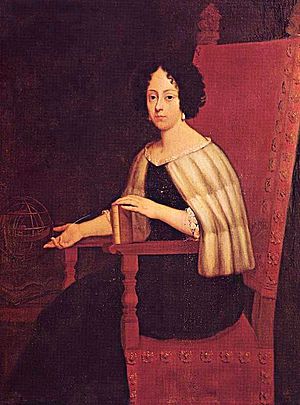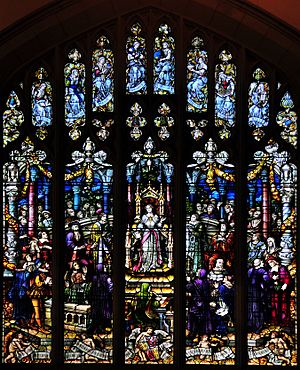Elena Cornaro Piscopia facts for kids
Quick facts for kids
Elena Cornaro Piscopia
|
|
|---|---|
 |
|
| Born | 5 June 1646 Ca' Loredan, Venice, Republic of Venice
|
| Died | 26 July 1684 (aged 38) Padua, Republic of Venice
|
| Resting place | Church of Santa Giustina |
| Known for | One of the first women to receive a degree from a university |
|
Philosophy career |
|
| Alma mater | University of Padua |
| Academic advisors | Carlo Rinaldini (philosophy) Felice Rotondi (theology) |
Elena Lucrezia Cornaro Piscopia (born June 5, 1646 – died July 26, 1684) was a brilliant Venetian scholar. She is famous for being one of the first women in history to earn a university degree. In 1678, she became the first woman to receive a Doctor of Philosophy degree.
Early Life and Family
Elena Cornaro Piscopia was born in Venice, Italy, on June 5, 1646. Her father, Gianbattista Cornaro-Piscopia, was a very important and wealthy noble. Her mother, Zanetta Boni, came from a poor family. Elena's parents were not married when she was born. This meant that, by law, Elena was not considered a noble, even though her father was.
In 1664, her father became the Procuratore di San Marco de supra. This was a very important job, like being the treasurer of St. Mark's Cathedral. It was one of the highest positions in Venice, second only to the leader, the Doge of Venice. Because of her father's high rank, Elena was still seen as important in society.
Elena's father tried to arrange marriages for her many times. However, Elena was not interested in marriage. Some early writers said she promised to remain unmarried at age 11, but this is debated by historians. In 1665, she joined a religious group called the Benedictine oblates. This meant she made a commitment to a religious life, but she did not become a nun.
Amazing Education
From a young age, Elena was known as a child genius. A family friend, Giovanni Fabris, encouraged her to study. She learned Latin and Greek from excellent teachers. By the age of seven, she was fluent in these languages, as well as French and Spanish. She later learned Hebrew and Arabic too! People called her the Oraculum Septilingue, which means "Seven-language Oracle."
Elena also studied mathematics, philosophy, and theology. She was a talented musician, playing the harpsichord, clavichord, harp, and violin. She even composed her own music. As she grew older, she became interested in physics, astronomy, and linguistics (the study of language).
Her philosophy tutor, Carlo Rinaldini, was a professor at the University of Padua. He even dedicated a book about geometry to a 22-year-old Elena. After her first tutor, Fabris, passed away, Rinaldini took over her studies.
Becoming a Scholar
In 1669, Elena translated a religious book from Spanish into Italian. This book was very popular and was printed five times between 1669 and 1672. As her fame grew, she was invited to join many scholarly groups. In 1670, she became the president of a Venetian scholarly society called Accademia dei Pacifici.

Elena's tutor, Carlo Rinaldini, suggested she get a degree in theology from the University of Padua. However, the local bishop, Cardinal Gregorio Barbarigo, said no. He believed women should not get degrees in theology. But he did allow her to pursue a degree in philosophy.
After studying very hard, Elena received her degree in Philosophy on June 25, 1678. The ceremony was a huge event! It took place in Padua Cathedral with many important people watching. These included university officials, professors, students, and many Venetian Senators. Guests from other famous universities like Bologna and Rome were also there.
Elena gave a one-hour speech in perfect Classical Latin. She explained difficult parts from the works of Aristotle, a famous ancient Greek philosopher. Everyone listened carefully. When she finished, Professor Rinaldini gave her the symbols of her degree. These included a book of philosophy, a laurel wreath for her head, a ring for her finger, and a special ermine cape. She was officially called Magistra et Doctrix Philosophiae, meaning "teacher and doctor in philosophy." This made her the first woman to receive a Doctor of Philosophy degree.
The last seven years of Elena's life were spent studying and helping others. She passed away in Padua in 1684 from tuberculosis. She was buried in the Church of Santa Giustina.
Her Lasting Impact
Just a few months after Elena earned her degree, another woman tried to get a degree at the University of Padua. However, the university changed its rules to stop women from graduating. The next woman to earn a doctorate in Italy was Laura Bassi, in 1732, at the University of Bologna.
Many memorial services were held for Elena after her death. Statues were made in her honor, and a special medal was created in 1685. In 1895, her tomb was opened, and her remains were placed in a new casket.
Elena's graduation ceremony is shown in a beautiful stained-glass window at Vassar College in the United States. She is also featured in a mural at the University of Pittsburgh. On June 5, 2019, Google celebrated her 373rd birthday with a special Google Doodle on their homepage.
See also
 In Spanish: Elena Cornaro Piscopia para niños
In Spanish: Elena Cornaro Piscopia para niños
 | Delilah Pierce |
 | Gordon Parks |
 | Augusta Savage |
 | Charles Ethan Porter |

